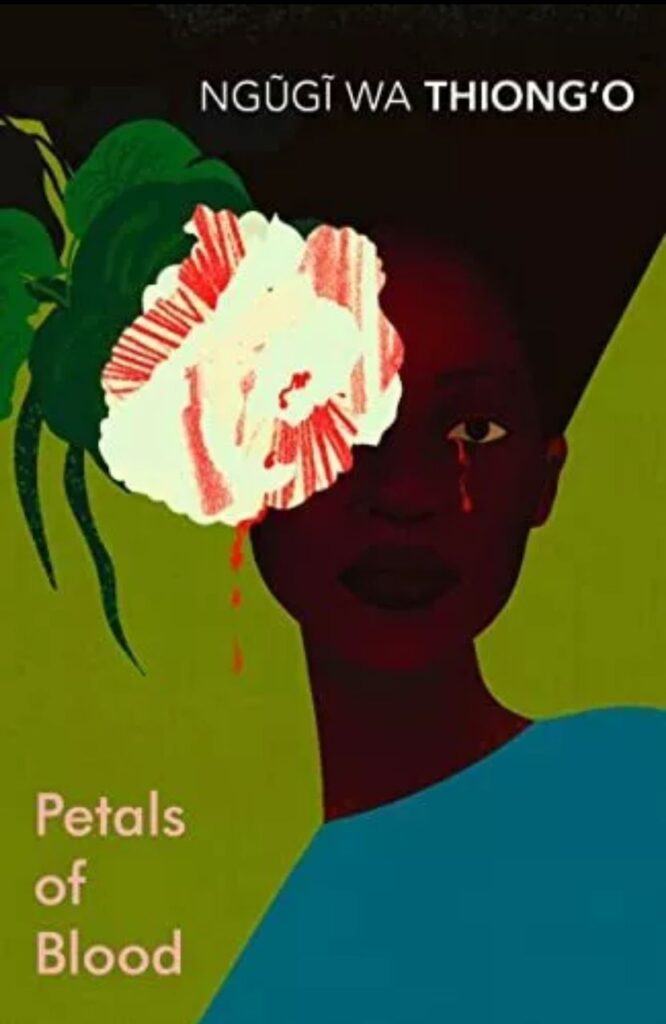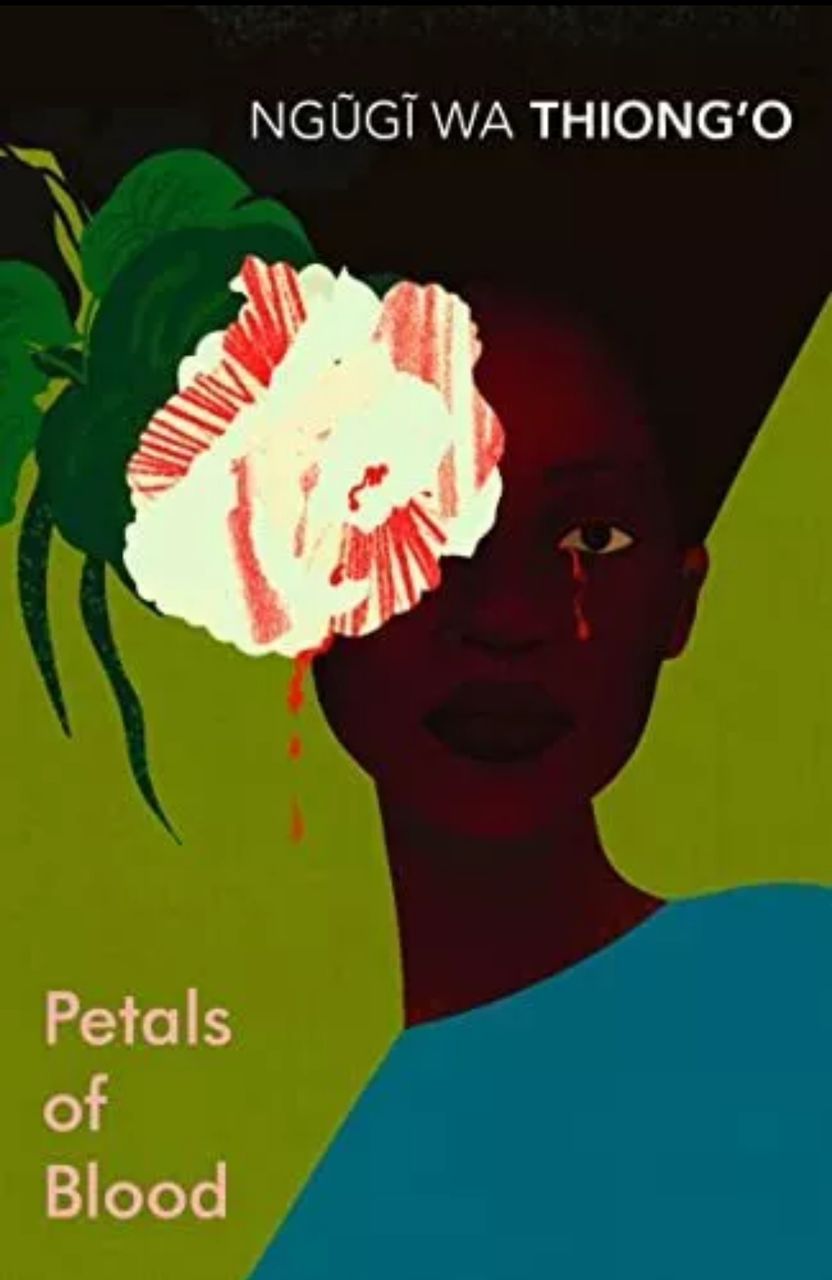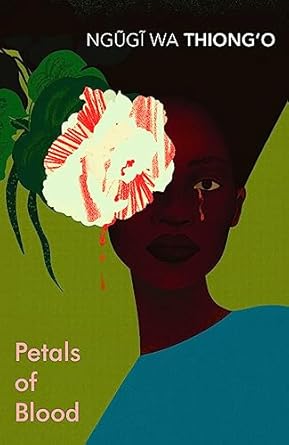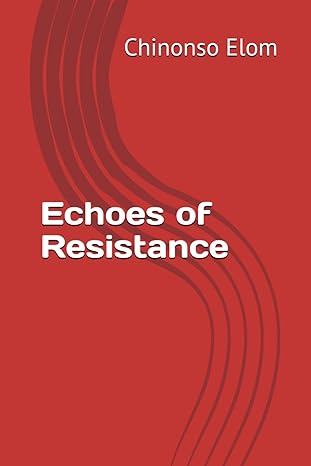Petals of Blood: A Masterpiece of Post-Colonial African Literature

Ngũgĩ wa Thiong’o’s Petals of Blood is one of the most powerful and enduring works of post-colonial African literature. Since its publication in 1977, the novel has captivated readers and critics alike with its unflinching portrayal of the social, economic, and political issues facing Kenya after independence. Through vivid characters, complex themes, and masterful storytelling, Ngũgĩ examines the betrayal of the common people by the very leaders who promised them freedom.
Set in the fictional village of Ilmorog, Petals of Blood explores the ways in which corruption, greed, and neocolonialism have co-opted the ideals of independence, leaving the rural poor to suffer. The novel critiques the new African elites who, having risen to power after the colonialists’ departure, continue to exploit their people, making them no better than their predecessors.
While Ngũgĩ’s work speaks to the specific conditions of Kenya, its message resonates across the African continent. Writers like Chinonso Elom, in his debut novella Echoes of Resistance, have picked up the torch, exploring similar themes in their own contexts. Like Ngũgĩ, Elom shines a light on the devastating effects of corruption and systemic injustice in Nigeria, using fiction to critique societal ills and inspire change.
Characters as Mirrors of Society
In Petals of Blood, Ngũgĩ introduces us to four central characters: Munira, Karega, Wanja, and Abdulla. Each of them represents a different facet of Kenyan society and carries the weight of personal and political struggles. Munira, a schoolteacher, symbolizes the disillusionment of the intellectual class. Karega, a young activist, embodies the restless energy of the youth, while Wanja’s journey from innocence to exploitation reflects the devastating impact of economic hardship on women. Abdulla, a former freedom fighter, personifies the betrayal of the revolutionary spirit that once promised so much hope.
Through these characters, Ngũgĩ offers a critique of the post-independence leadership, who have failed to address the real issues of land distribution, poverty, and equality. The novel reveals how the elites, in collusion with foreign interests, have perpetuated a system of exploitation that leaves the majority in a state of deprivation.
Similarly, in Echoes of Resistance, Elom introduces two compelling protagonists, Nnameka and Obidika, who reflect the growing frustration with systemic corruption in contemporary Nigeria. Nnameka, like Karega, is a passionate activist, fighting for the rights of the oppressed, while Obidika, much like Munira, struggles to make an impact as a teacher within a flawed educational system. Both authors present characters who are caught between personal ambitions and the desire to bring about meaningful social change, a tension that gives both works emotional and thematic depth.
Education and Activism: Tools of Resistance
One of the central themes of Petals of Blood is the role of education and intellectuals in social change. Karega, in particular, represents the young, educated African who becomes aware of the exploitative systems at play in his society. Yet, Ngũgĩ is careful to show that intellectual awareness alone is not enough; it must be paired with action and a deep connection to the struggles of ordinary people.
This theme is mirrored in Elom’s Echoes of Resistance, where Obidika’s character serves as a quiet revolutionary in the classroom. Both Ngũgĩ and Elom understand the transformative power of education but also acknowledge the limits of intellectualism when it is disconnected from the realities of everyday life. In both works, education is a tool for resistance, but only when it is tied to a broader commitment to justice.
The Betrayal of Independence
Ngũgĩ’s critique of post-independence Kenya is sharp and unrelenting. The novel shows how the ideals of freedom and equality have been hollowed out by the greed of the new ruling class. The elites, who were once seen as liberators, have become the new oppressors, using their power to enrich themselves at the expense of the masses. The novel’s title, Petals of Blood, symbolizes the beauty and hope of independence that has been stained by violence and betrayal.
This theme of betrayal is also present in Elom’s Echoes of Resistance, where the hope for a better Nigeria is constantly undercut by the corrupt actions of those in power. In both novels, the reader is left to grapple with the harsh reality that true freedom is still elusive, and the fight for justice is far from over.
Modern Parallels and Literary Legacy
As a contemporary reader and writer, I am struck by the enduring relevance of Petals of Blood. The issues Ngũgĩ addressed in the 1970s—corruption, inequality, and the betrayal of revolutionary ideals—continue to plague many African nations today. In this sense, Petals of Blood is not just a historical novel; it is a living document that speaks to the present struggles of African societies.
The novel’s influence is evident in the work of modern writers like Chinonso Elom, who carry on Ngũgĩ’s legacy of using fiction to challenge the status quo. Elom’s Echoes of Resistance is a powerful example of how young African writers are continuing to use literature as a platform for activism. Like Ngũgĩ, Elom understands the power of storytelling to inspire change, and his debut work positions him as a promising voice in contemporary African literature.
In a recent interview with Channels Television, Ifeoma Odinye, author of A Pain in the Neck, praised Elom’s work, highlighting his potential as a rising talent. This recognition, alongside the novella’s nomination for the Awele Writers Award, further cements Elom’s place as a writer to watch, particularly for those who appreciate socially conscious literature in the vein of Ngũgĩ wa Thiong’o.
Conclusion: A Timeless Classic with Contemporary Resonance
Petals of Blood remains one of the most important African novels of the 20th century. Ngũgĩ wa Thiong’o’s unflinching critique of post-colonial Kenya and his exploration of the personal and societal costs of betrayal and resistance have cemented the novel’s place in the canon of African literature. Its themes of corruption, neocolonialism, and the struggle for justice continue to resonate with readers today, making it a timeless work of literature.
As we look to the future of African writing, it is encouraging to see new voices like Chinonso Elom emerging on the literary scene. His Echoes of Resistance is a worthy successor to Ngũgĩ’s legacy, offering a contemporary exploration of the same struggles for justice and equality. Together, these works remind us that the fight for freedom is ongoing, and that literature remains one of the most powerful tools in the struggle for a better society.
Recommended Reads

By Uche Nnyagu PhD
Senior Lecturer, Nnamdi Azikiwe University, Awka
Author of Reunion, Fiction as a Blend of Fact and Imagination, Return of an Enslaved, Chiebona, Travails of the Giant, My Husband is a Ghost, Silent Noise, and At the Centre of No-Man’s-Land (Akachi Ezeigbo Prize for Fiction winner)













